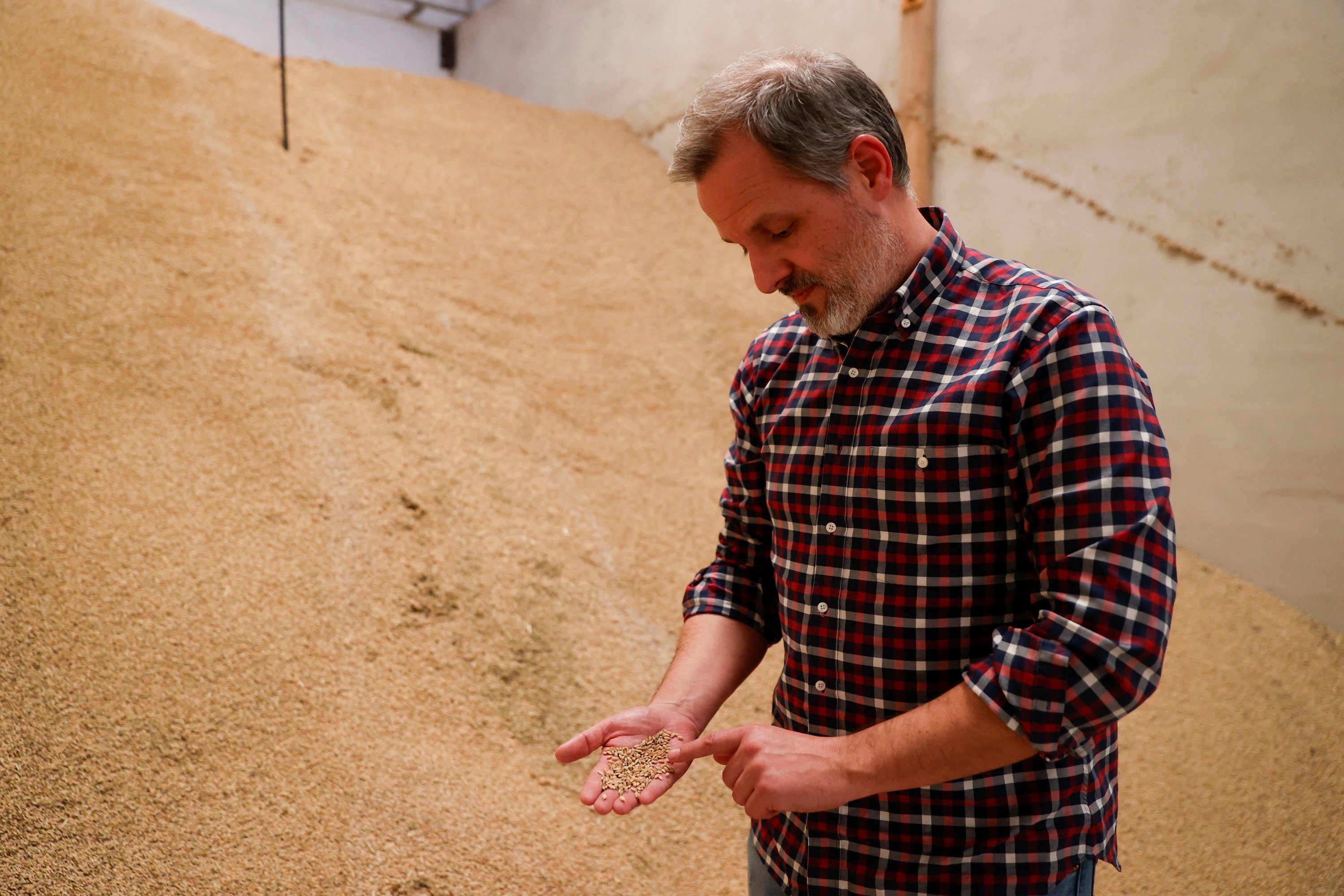© Turkuvaz Haberleşme ve Yayıncılık 2024
Expressing their growing discontent with rising expenses, bureaucracy and low-cost competition from outside the European Union, thousands of Spanish farmers stepped up their protest by driving tractors through city streets on Thursday, causing traffic disruptions.
The protests, which started spontaneously on Tuesday after spilling over from other EU countries, are backed by the country's three main farmers' associations.
Dozens of tractors surrounded the regional parliament in Barcelona after their drivers spent the night in the city center.
Mirroring waves of protests across Europe, thousands of farmers in Spain were on the streets on Wednesday, blocking highways and access to a port in the eastern part of the country and an airport in the south.
Farmers disrupted traffic in smaller cities all over the country, including central Avila, Vitoria in the north and Antequera in the south.
Spanish farmers have joined their peers from Germany, France, Italy and Belgium, where protests have sometimes turned violent.
Farmers across the EU claim the rules to protect the environment make them less competitive than farmers in other regions. They also say they are choked by taxes and red tape.
Large amounts of imports from Ukraine, for which the EU has waived quotas and duties since Russia's invasion, and renewed negotiations to conclude a trade deal between the EU and South American bloc Mercosur have fanned discontent about unfair competition.
The Spanish Interior Ministry said police detained 12 people during Wednesday's protests that included blockades of several large goods distribution centers. The government and retail associations do not expect imminent food shortages.
The Spanish Transport Federation (Fendamiser) said the blockades were affecting more than 80,000 trucks.
Since Tuesday, Spanish farmers have blocked highways and ports in Malaga and Castellon and boulevards in Barcelona and elsewhere.

On Wednesday, access to the eastern port of Castellon and the southeastern Jerez airport were temporarily cut off. State news agency Efe said that 1,000 tractors were heading slowly toward Barcelona's city center, causing major traffic jams on roads into the northeastern port capital of Spain's Catalonia region.
There have been other protests in countries such as France, Poland and Greece in recent days.
Foreign Minister Hadja Lahbib of Belgium, which currently holds the EU's rotating presidency, said Wednesday that the rules governing farming "need to be reassessed in the light of current realities.”
European Commission Vice President Maros Sefcovic said that, "Resource scarcity, price shocks and an increasingly competitive global market are having a huge impact on the farming sector and rural communities."
"We have seen from the farmers protesting on the streets of Europe that many of them feel trapped, that their needs are not being met. So, we must act,” he added.
The protests in Spain prompted the government to distribute an additional 269 million euros ($290 million) in subsidies for as many as 140,000 farmers and for the European Commission to scrap a plan to halve pesticide use in the bloc.
Meanwhile, some of the producers in the Valencia region feared the pesticide ban on the Spanish rice variety traditionally used to make the classic dish "paella" would deeply impact the production.
The rice variety used to make paella is under threat from a fungus after the European Union banned a pesticide farmers said they relied upon, in another example of how the bloc's environmental rules are angering growers.
Three rice producers in Valencia said their harvest of arroz bomba, or bomb rice, a variety grown almost exclusively in Spain, was half the 10-year average in 2023 as a result of the Pyricularia fungus, which causes rice blast disease.
Bomba rice "is very likely to disappear," said Miguel Minguet, a rice farmer in the Albufera Natural Park in Valencia. "Our crop is going to be lost to regulations."
Meanwhile, major exporters such as Brazil, India and Cambodia are widely using the pesticide to protect their own crops.
The EU in 2018 stopped authorizing Tricyclazole fungicide because it ruled it could be harmful to human health.
It had been relied upon for 40 years to combat the fungus affecting bomba rice in Spain's wetlands, the farmers said.
What angers farmers perhaps the most is that the EU still allows imports to have small traces of the fungicide.

"There's one set of rules for Europe and another for those producing outside," said Emilio Gonzalez, a professor at the School of Agricultural and Forestry Engineering at the University of Cordoba.
Imported goods need to respect residue levels set by the EU, a spokesperson for the European Green Deal team said.
The levels "ensure the products are safe for human consumption," they said.
Farmers in the Albufera wetlands are still able to use at least two other fungicides to protect rice production, which filter into the ecosystem and affect shrimp populations, according to a 2023 study led by Andreu Rico, a researcher in biodiversity at the University of Valencia.
Rice is "an intensive monoculture where the disease spreads easily from one field to another," Rico said.
The decline in bomba rice production has caused the price to double in three years, selling for more than 5 euros ($5.39) a kilogram in retailers such as Carrefour or Ahorramas.
Spain's biggest supermarket chain Mercadona confirmed shortages in recent months but supply "is gradually recovering in almost all our stores in Spain," it said.
